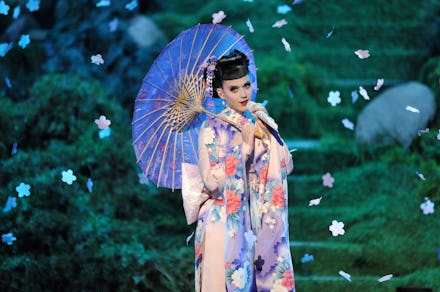Yes, Katy Perry's Sexy Geisha AMA Performance Was Racist

I didn't watch the AMAs on Sunday night, because I was busy not hating my life, but there was no escaping Katy Perry's geisha fiasco nonetheless. I woke up to headlines like "Katy Perry Called A Racist," to articles that put the word racist in quotations.
Why the scare quotes? The offensiveness of Perry's performance seemed clear to me.
Perhaps it's too much to ask of media outlets to flat out say that Katy Perry's AMA performance Sunday night was racist. Instead, they opted to report that she was described as racist before pitting simplistic opposing views against one another. Jezebel, for instance, made almost no statement, instead quoting the question Vulture landed on: "Was Perry's Great Wave of Japanese signifiers offensive, simply stereotypical, or harmlessly deferential in an inert Katy Perry maximalist way?"
Kotaku cited variably insightful and articulate Twitter accounts to explore similar questions, while Cosmo thought "none of this is quite like the cupcake boob raciness she usually gets attention for." The Huffington Post described the "controversy" surrounding the performance, as if we don't know how controversy works.
Since they won't say it, I will: Katy Perry's AMA performance Sunday night was a racist sack of crap.
Between the lack of Asian women on stage, the heavy-handed use of bowing and shuffling around in the choreography, and the ethno-confused set and costume design, Perry presented her viewers a one-dimensional Eastern fantasy drawn by a Western eye right out of the gate.
All of these things bespeak laughable ignorance, yet I'm not laughing.
I am half-Korean. Unfortunately, this means that I have to be hyper-aware of the geisha trope, because it gets ascribed to my identity as a non-white person, as a woman, and as a sexual being, by the white America that doesn't know that Asians are not all the same, and particularly by white male America which tends to unhealthily fixate on hyper-sexualized tropes regarding Asian women. I should not have to deal with this, but I do.
I once posted a picture of myself in dark lipstick to Facebook. A white man I know commented simply, "You look like a geisha."
I am not Japanese. I hadn't powdered my face, or drawn on eyebrows, or pulled back my hair. My lipstick wasn't even red, but a deep purple. I did not look like a geisha — I looked like me in lipstick. At first, I protested, "That's a weird thing to say!" But later I deleted his comment and mine.
It's not just Facebook, either. I can't go a week on OkCupid without being targeted as the object of some guy's Asian fetish, typically some guy looking for a submissive partner, and I'm unfortunately far from alone.
This kind of racialized attention triggers intense, generalized anxiety about my romantic life and my body, so I feel personally offended when Katy Perry goes on national television in a sexed up "geisha" costume.
I feel offended because this "costume" was actually a combination of Japanese and Chinese traditional formal wear (but with plenty of room for cleavage), because she was surrounded by dancers in "yellowface" who acted exaggeratedly dainty in the face of a cultural understanding that geishas are essentially escorts, because her performance was a disservice to Asian women at large who deal with these kinds of identity snares and relational barriers all the time.
I don't think it's too much to ask that rich, white, female celebrities who are privileged to be able to choose how they present themselves not make a buck off of misrepresenting entire continents' worth of culture.
Perry's "geisha" get up is a flat, inaccurate, sexualized identity that has nothing to do with Asian cultures. Her performance explicitly endorses a point of view that trivializes and caricaturizes Asians in popular American culture by signing off on the cute-sensual-shy expectation of Asian women. She pandered to a white audience by all but literally skinning Asian women. She essentially puts Asian racial identities on a level with her other schtick of "cupcake boob raciness." And the next day, America's media outlets asked if the ensuing controversy was merely "superficial" rather than racist, as if the two are mutually exclusive.
It's racist. The aspirational cuteness of Perry's "geisha" is ugly, condescending, and, yes, very offensive. Whether Katy Perry herself is additionally superficial is not a question on which we need to waste any time or energy.